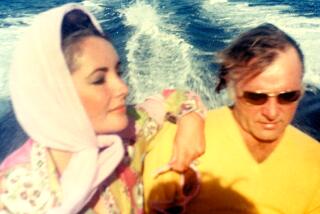Book Review : Burroughs Eludes His Biographer
- Share via
Literary Outlaw: The Life and Times of William S. Burroughs by Ted Morgan (Henry Holt: $27.50; 630 pages)
Near the end of his book about writer William Burroughs, Ted Morgan tells us that “the biographer,” as he refers to himself, had mixed feelings about undertaking the project.
On the one hand, “the biographer wondered what kind of mess he had got himself into agreeing to write a book about a friend.” On the other hand, having written various posthumous biographies, he thought that “it would be a blessing to work from life.”
The biographer was prescient about the first; mistaken about the second.
Storyteller Vanishes
Morgan’s book about the turbulent, avant-garde writer, author of “Naked Lunch,” “Nova Express” and others, is laborious and detailed. The labor is one of love, though not excessively so. The problem with this massive book is not that Morgan is uncritical of his subject, but that he has been engulfed by it. All but literally.
A biography needs a subject, and certainly Burroughs is a subject. But it also needs a biographer. In his seemingly unlimited access to Burroughs--to his verbal recollections conveyed with a photographic memory for everything he did, felt and saw in his 74-year life, to his archives, and to his friends--Morgan all but disappears.
We hear a voice and wonder whose it is. Without quotation marks or attribution, it ought to be Morgan’s; and yet, for an overwhelming part of the time, it sounds like Burroughs’. The solemn disjointment, the sweeping generalizations, the oddly pointed phrase, and the frequent incoherence are all there.
At its worst, it can go like this bit from an account of a meeting of Burroughs, Allen Ginsberg, Peter Orlovsky and Timothy Leary in Tangier:
“Bill did want everyone included, though the basis of inclusion was that they had to alter their minds, in the sense that Allen’s mind told him that he was a poet and Peter’s lover, both of which Burroughs thought were pointless.”
Who Is Speaking Here?
Is Morgan writing this, or is it a paraphrase of Burroughs’ wobbles or of Ginsberg’s altered states? And who is speaking, author or subject, in this assertion: “Obviously, the state hated drugs because drugs gave people power over themselves. . . .”?
Burroughs, no doubt. To a mind-numbing extent, this is not a life and times of William Burroughs, but a life and times as told to Ted Morgan. Burroughs’ gifts do not include a linear narrative, detachment, analysis or an explicit point of view. A biography requires them. Even empathy is meaningless if the mind that is doing the empathizing is submerged for much of the time. Morgan has yielded his function up to his subject.
The lack of a biographer’s voice turns the book into an exhaustive rambling around Burroughs’ life.
It has been a life lived at extremes, yet conducted with a curious inert formality. Burroughs came from an upper middle class background. He had a small allowance from his father, who had inherited a relatively modest portion from his own father, the inventor of the adding machine.
Burroughs took drugs and, in his younger days, dealt them. He drifted around with thieves and hustlers. He was arrested several times; one arrest was in Mexico, after he killed his wife while trying to shoot a bottle off her head. He was a member of the Beat circle of Ginsberg and Jack Kerouac and later became a kind of elder statesman to hippies, rock and punk groups, and the New York post-moderns. He had numerous homosexual relationships.
Morgan covers all this in detail. He tells of an early, only partly remembered incident involving a sexually perverted nurse which, Burroughs believes, marked him for life. He tells of Burroughs’ time at a rigorous boarding school in the New Mexico desert, where a teacher preached manliness and liked to see the boys undress.
Vivid Account of Beats
There is a vivid account of life among the Beats in New York. There are detailed accounts of the difficult efforts to get “Naked Lunch” published, and of its acquittal at an obscenity trial in Boston. There are lucid summaries--not easy--of Burroughs’ principal works. Morgan, who likes some of them and not others, makes no effort at rigorous criticism, but he provides a fair sampling of critical views. He also gives us Burroughs’ distaste for the critics or, as he calls them, the “Assayers of Scribes.”
A great deal of space and detail goes to Burroughs’ comings and goings, to visits and encounters, to druggy parties and lovers’ quarrels. Told in seeming and muffled paraphrase of Burroughs’ words, it goes on and on and on. The effect is of old gossip.
By stepping aside so much, and by leaving so much to his subject, Morgan plays into the hands of Burroughs’ fabled elusiveness. Under all the talk, he has slipped away.
More to Read
Sign up for our Book Club newsletter
Get the latest news, events and more from the Los Angeles Times Book Club, and help us get L.A. reading and talking.
You may occasionally receive promotional content from the Los Angeles Times.










